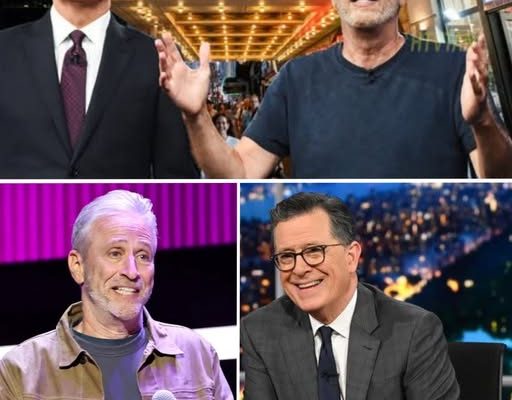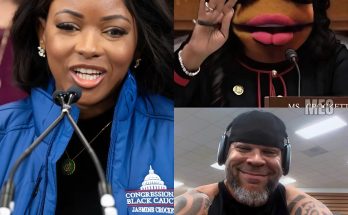
Jon Stewart’s powerful on-stage chant, “SACK THE F* UP,” during a tense late-night segment shattered CBS’s control and sparked a nationwide conversation about media censorship, leaving executives scrambling and viewers inspired by his bold defiance against corporate narratives.
On a fateful evening in mid-August 2025, Jon Stewart took to the stage of his late-night show, a platform he had graced for years with wit and humor.
However, this night was different. After days of silence following the abrupt cancellation of his friend’s show, the tension in the air was palpable.
The atmosphere was thick with unspoken words, and it was clear that the narrative surrounding the cancellation had been carefully crafted and buried by CBS.
But as the studio lights dimmed and the cameras rolled, Stewart was ready to break that silence.
As the audience settled in, there was an unusual sense of anticipation. Stewart, known for his sharp commentary and ability to dissect cultural issues, stood at the center of the stage. The usual laughter and applause were replaced by an eerie stillness.
He began his segment not with a joke, but with a calm, deliberate tone that commanded attention. The audience leaned in, sensing that something monumental was about to unfold.
Then, in a moment that would reverberate through the network and beyond, Stewart led the audience in a powerful chant.
“SACK THE F* UP,” he declared, his voice unwavering and strong. The words hung in the air, a stark contrast to the usual jovial banter of late-night television.
It was a rallying cry, not just for his audience but for anyone tired of the status quo. The choir of voices echoed his sentiment, creating a wave of solidarity that swept through the studio.
The impact was immediate and profound. In the control room, CBS executives watched in disbelief as their carefully curated narrative began to unravel.
The legal team, usually so quick to respond to potential controversies, fell silent.
Phones started lighting up with frantic messages, and executives vanished mid-call, leaving their aides scrambling to manage the chaos that was unfolding live on air.
This was not just a moment of defiance; it was a calculated strike against a network that had tried to silence dissent.

As the clip of Stewart’s bold proclamation spread like wildfire across social media and news outlets, CBS found itself in a precarious position.
What had started as a simple late-night segment had transformed into a national conversation about censorship, control, and the power of media.
Stewart’s words resonated with viewers who felt similarly frustrated by the media landscape, where narratives were often manipulated to serve corporate interests.
In the days that followed, CBS attempted to downplay the incident, but the damage was done. The fallout was not just a fleeting moment of controversy; it signaled a significant shift in the relationship between media personalities and the networks that employed them.
Stewart’s bold message was clear: there was a line that had been crossed, and he was not afraid to stand on the other side.
Critics and fans alike began to speculate about the implications of Stewart’s words.
Was this merely a protest, or was it a call to action? Many viewed it as a line in the sand, a challenge to the network and its executives to confront the realities of their programming decisions and the narratives they chose to promote.
The questions surrounding the event only deepened as CBS continued to avoid direct inquiries about the incident, further fueling speculation about what had transpired behind closed doors.
The night of Stewart’s explosive segment marked a turning point not just for him, but for the entire late-night landscape.
It raised critical questions about the role of comedians and media figures in shaping public discourse and holding powerful institutions accountable.
As the dust settled, it became evident that Stewart had not only reclaimed his voice but had also ignited a movement that could no longer be ignored.
In the wake of this unprecedented moment, viewers are left wondering: what will happen next? How will CBS respond to the growing unrest among its audience and talent?
And most importantly, will Jon Stewart continue to be the voice of dissent in a media world that desperately needs it? As the narrative unfolds, one thing is certain: the landscape of late-night television may never be the same again.






